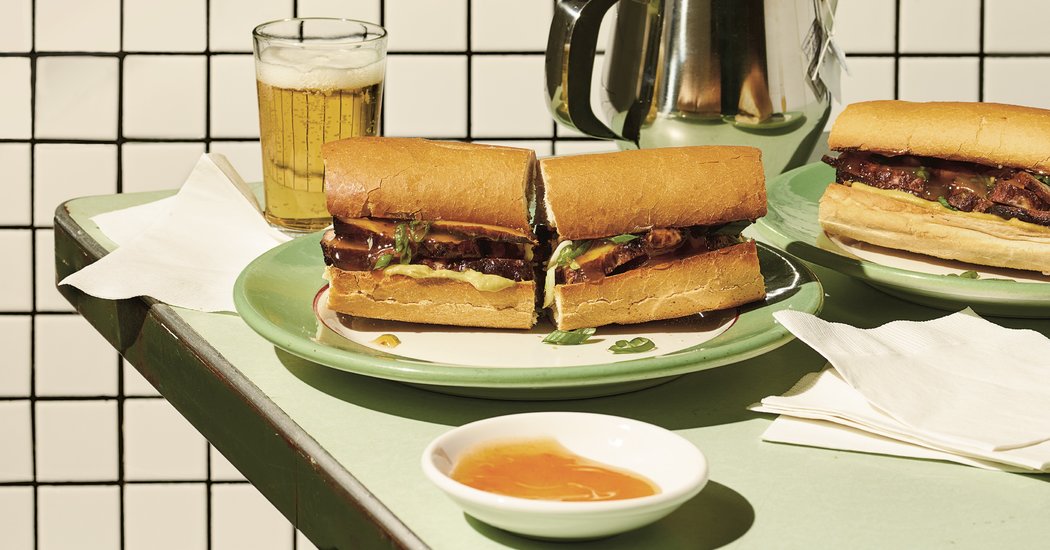
Chinese roast pork on garlic bread is one of the great New York sandwiches, a taste of the highest peaks of Catskills cuisine: thin-sliced, Cantonese-style char siu married to Italian-American garlic bread beneath a veil of sweet-sticky duck sauce. Sandwich historians suggest that it was the creation of Herbie’s Restaurant in Loch Sheldrake in the 1950s, and it soon became a favorite of the summertime borscht-belt crowd — after-show entertainers and Jewish bungalow kids with observant parents lining up alongside one another for this taste of illicit exoticism, unkosher and delicious in the extreme. ‘‘It’s the ultimate assimilation crossover food,’’ the food writer, radio host and erstwhile restaurant critic Arthur Schwartz told me. ‘‘That sandwich is a symbol of acculturation.’’
Herbie’s roast-pork sandwich spawned imitators across the mountains and eventually in the middle-class Jewish diners of Brooklyn and along the South Shore of Nassau County, on Long Island. The children, grandchildren and great-grandchildren of the men and women who first ate the sandwich can eat it still. Chinese roast pork on garlic bread remains on the menus of the New Floridian in Brooklyn and Mitchell’s Diner in Oceanside. A few years back, the chef Ivan Orkin added a Japanese dimension at Ivan Ramen in Manhattan, serving it on a toasted miso-garlic hero and calling it the Herbie’s International. Court Street Grocers in Brooklyn and Manhattan serves Catskill Roast Pork, with housemade duck sauce.
The component parts of the sandwich are simple. There is the pork, which in many cities you can buy at the local Cantonese barbecue place. But you can also make Chinese-style roast pork easily at home. And while you’ll maybe miss the red from the food coloring the professionals use to dye the exterior of the meat, you can more than make up for it by using luscious heritage pork instead of the commodity kind everyone else uses, which is prone to dryness. Either way, you should buy or make a lot, because char siu is an invaluable kitchen friend, particularly for those in search of quickly assembled midweek family meals. I mix strips of the pork into stir-fries, or noodles slicked with peanut butter and chile oil. Sometimes I chop the meat into nuggets to stir into eggs and onions for a kind of ersatz egg foo yong. Plain char siu over rice? That can be a satisfying meal.
The garlic bread is equally important, providing buttery bite against the sweetness of the meat. You can make it either as I do in the recipe below, or in whatever manner you’ve become accustomed to. Over the years, I’ve tried making it with Very Good Bread and with Italian loaves from the supermarket. This sandwich succeeds with both.
Finally, there’s the duck sauce. You can either use leftover packets from past Chinese takeout orders or create your own by cutting vinegar into a few tablespoons of apricot preserves until the mixture tastes the way you like. Then, cut your pork and layer it onto the bottom slice of hot garlic bread. Drizzle with the sauce, and sprinkle a few chopped scallions over everything. Some people add a slash of hot mustard, others fresh pickles or coleslaw, but it doesn’t really need anything else except the remaining slice of bread.
In 2008, Schwartz published a recipe for that very sandwich — an RPG, some call it — in his book ‘‘Arthur Schwartz’s Jewish Home Cooking: Yiddish Recipes Revisited.’’ Trouble and woe ensued, he said, what in Yiddish is called tsoris. Some bookstores in Brooklyn’s more conservative Jewish neighborhoods wouldn’t sell the title, Schwartz said. ‘‘It was that word, ‘pork.’ The kosher police wouldn’t have it.’’
But there is a kosher version Schwartz pointed out, made with veal. ‘‘You know a pork sandwich is delicious if someone thinks up a way to make it kosher,’’ he said. You used to be able to get roast veal on garlic bread at the Mill Basin Deli or Jay & Lloyd’s Kosher Deli, both in Brooklyn. Now you’ll need to get lucky with a caterer. Schwartz told me he’d been served a kosher RPG at a wedding in the Hasidic Lubavitch community, its preparation approved by a mashgiach, a supervisor of Jewish dietary law. I asked him how garlic bread, loaded with butter, could possibly make for a kosher meat sandwich. Schwartz laughed, already delighted with his answer. ‘‘Fleischmann’s margarine!’’




